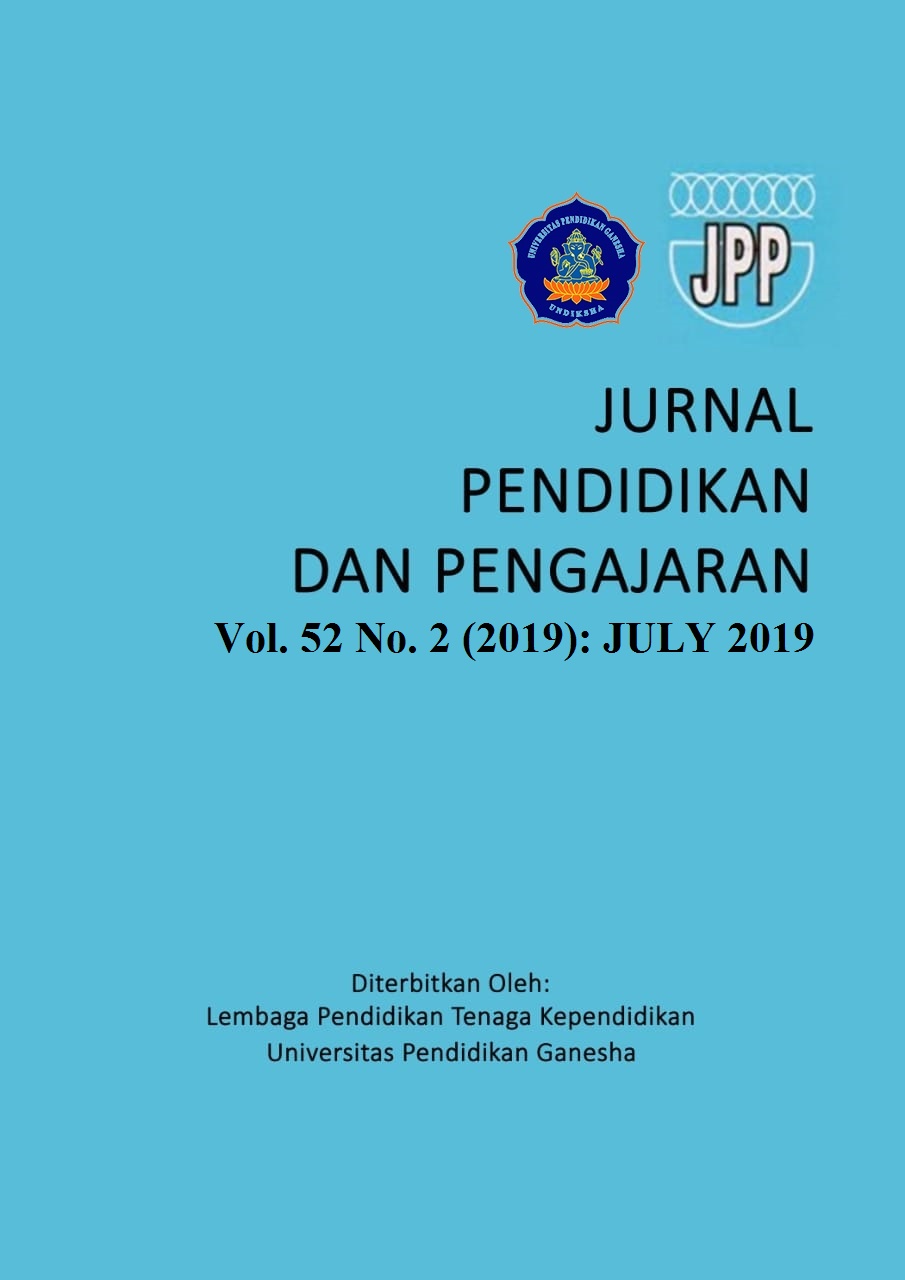Development of problem-based learning module in economics to increase students’ critical thinking
DOI:
https://doi.org/10.23887/jpp.v52i2.17867Kata Kunci:
Economic learning modules, problem based learning, critical thinking, research and development.Abstrak
Module is a teaching material as an important component in the learning process. This research aims to produce economic learning modules with a problem based learning approach for students of class XI IPS that are feasible and effective to improve critical thinking skills. This type of research is research and development developed by Borg and Gall with the following stages: (1) preliminary study, (2) planning, (3) initial product development, (4) initial field test, (5) revision of main products, (6) test of main products, (7) revision of operational products, (8) test of operational fields, (9) revision of final products, (10) distribution. The economic learning module with the problem based learning approach was tested in the control and experimental classes, each of the 35 X-IPS students in MAN 2 Jombang. The result of research are: 1) Economic Learning Modules with Problem Based Learning Approaches which is feasible based on the material and media experts in the category of "Good", the response students get a "Very good" category, 2) results Economic learning modules with an effective problem based learning approach to improve critical thinking skills.
Referensi
Abdullah, N. I., Tarmizi, R. A., & Abu, R. (2010). The effects of Problem Based Learning on mathematics performance and affective attributes in learning statistics at form four secondary level. Procedia - Social and Behavioral Sciences, 8(5), 370–376. https://doi.org/10.1016/j.sbspro.2010.12.052
Andi, P. (2014). Pengembangan Bahan Ajar Tematik Tinjauan Teoritis dan Praktis. Jakarta: Kencana Prenadamedia Group.
Applin, H., Williams, B., Day, R., & Buro, K. (2011). A comparison of competencies between problem-based learning and non-problem-based graduate nurses. Nurse Education Today, 31(2), 129–134. https://doi.org/10.1016/j.nedt.2010.05.003
Arkinoglu, O., & Tandogan, O., & R. (2007). The Effects of Based Active Learning in Science Education on Students’ academic achievement, attitude, and concept learning. International journal of biological macromolecules, 40(3), 217-223. https://doi.org/10.1016/j.ijbiomac.2006.07.006
Daryanto & Raharjo. (2012). Model Pembelajaran Inovatif. Yogyakarta: Gava Media.
Hung, W. (2011). Theory to reality: A few issues in implementing problem-based learning. Educational Technology Research and Development, 59(4), 529–552. https://doi.org/10.1007/s11423-011-9198-1
Lin, C. & Wu, R. (2016). Effects of Web-Based Creative Thinking Teaching on Students’ Creativity and Learning Outcome, Eurasia Jurnal of mathematics, science, and technology education, 12(6), 1675-1684. https://doi.org/10.12973/eurasia.2016.1558a.
Marra, R., Jonassen, D., Palmer, B., & Luft, S. (2014). Why Problem-Based Learning Works: Theoretical Foundations. Journal on Excellence in College Teaching, 25, 221–238.
Mohd Zabit, M. N. (2010). Critical Thinking Skills In Teaching Business Education In Malaysia : A Literature Review. American Journal of Business Education, 3(6), 19–32.
Sihaloho, R. R., & Sahyar, E. M. G. (2017). The Effect of Problem Based Learning (PBL) Model toward Student’s Creative Thinking and Problem Solving Ability in Senior High School. Journal of Research & Method in Education State University of Medan, 7(4), 11-18.
Stanley, T., & Marsden, S. (2012). Problem-based learning: Does accounting education need it? Journal of Accounting Education, 30(3–4), 267–289. https://doi.org/10.1016/j.jaccedu.2012.08.005
Temel, S. (2014). The effects of problem-based learning on pre-service teachers’ critical thinking dispositions and perceptions of problem-solving ability. South African Journal of Education, 34(1), 1–20. https://doi.org/10.15700/201412120936
Walker, A., Recker, M., Robertshaw, M. B., Osen, J., Leary, H., Ye, L., & Sellers, L. (2012). Integrating Technology and Problem-based Learning: A Mixed Methods Study of Two Teacher Professional Development Designs. Interdisciplinary Journal of Problem-Based Learning, 5(2), 9–27. https://doi.org/10.7771/1541-5015.1255
Witte, K. De, & Rogge, N. (2012). Problem-based learning in secondary education : Evaluation by a randomized experiment randomized experiment. Education Economics, 24(1), 58–82. https://doi.org/10.1080/09645292.2014.966061
Unduhan
Diterbitkan
Cara Mengutip
Terbitan
Bagian
Lisensi
Authors who publish with Jurnal Pendidikan dan Pengajaran agree to the following terms:- Authors retain copyright and grant the journal the right of first publication with the work simultaneously licensed under a Creative Commons Attribution License (CC BY-SA 4.0) that allows others to share the work with an acknowledgment of the work's authorship and initial publication in this journal
- Authors are able to enter into separate, additional contractual arrangements for the non-exclusive distribution of the journal's published version of the work (e.g., post it to an institutional repository or publish it in a book), with an acknowledgment of its initial publication in this journal.
- Authors are permitted and encouraged to post their work online (e.g., in institutional repositories or on their website) prior to and during the submission process, as it can lead to productive exchanges, as well as earlier and greater citation of published work. (See The Effect of Open Access)





